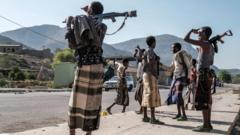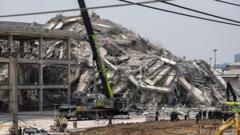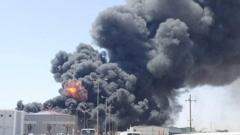This article investigates the complexities of delivering aid in a conflict-ridden Myanmar, where military operations continue unabated, even as the country urgently needs assistance following a catastrophic earthquake.
Military Actions Escalate in Myanmar Amid Earthquake Relief Efforts

Military Actions Escalate in Myanmar Amid Earthquake Relief Efforts
As Myanmar grapples with the aftermath of a devastating earthquake, military aggression against humanitarian aid efforts intensifies, causing alarm among local and international communities.
In the wake of a tragic earthquake that resulted in approximately 2,700 deaths, Myanmar's military has drawn significant criticism for attacking a convoy of relief supplies from the Chinese Red Cross intended for affected areas, particularly Mandalay. This incident, reported by the Ta’ang National Liberation Army (TNLA), occurred as the vehicles were en route to deliver much-needed assistance. The attack, consisting of machine-gun fire at Ummati village, raises serious concerns about the military's commitment to cease hostilities, especially in light of ongoing civil conflict since the coup that occurred four years ago.
Myanmar's junta chief, Senior Gen. Min Aung Hlaing, stated that military operations would continue under the guise of “necessary protective measures,” contradicting the needs of the civilian populace amidst a humanitarian crisis. The TNLA reported that the armed forces forced the convoy to retreat but later provided protection to ensure its aid reached victims in Mandalay.
China, which maintains strong diplomatic ties with Myanmar, quickly mobilized aid following the disaster, committing approximately $14 million in emergency support and deploying rescue teams to assist. Meanwhile, the National Unity Government, the country’s exiled opposition, and the Three Brotherhood Alliance (composed of several rebel groups) declared cease-fires in the aftermath of the earthquake—actions that were seemingly disregarded by the military.
Despite international efforts from organizations like the World Food Program and UNICEF to alleviate the plight of the affected, reports indicate that military interventions are obstructing relief operations. Observers cite lethal military airstrikes, such as one that reportedly killed 38 young soldiers of the Kachin Independence Army, underscoring the stark challenges faced by aid groups in rapidly deteriorating security environments.
Additionally, there are growing concerns about civilian safety as the junta's past actions have already resulted in significant casualties; advocacy groups report that the military and its affiliates have killed over 6,476 individuals since the coup, encompassing pro-democracy activists and before the earthquake. Local efforts to facilitate search and rescue operations have also been hampered by the military's restrictions including curfews and blocking access to disaster sites.
As the humanitarian crisis deepens, the international community continues to advocate for the safety and rights of civilians caught in the crossfire of a relentless civil war, raising crucial questions about the future of Myanmar and the efficacy of humanitarian operations under a regime that prioritizes military objectives over civilian needs.




















